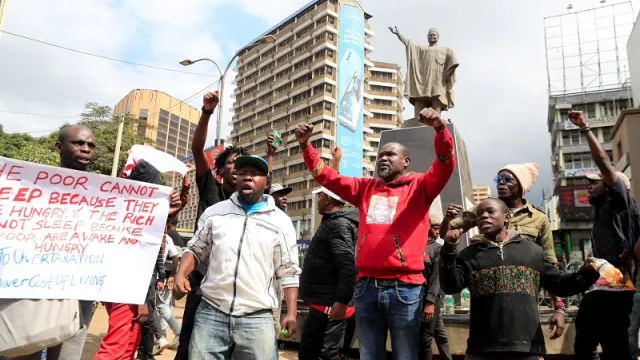Police abducted and tortured protesters — Human Rights Watch

A new Human Rights Watch report outlines a chilling crackdown on dissent, noting that Kenyan security forces targeted individuals, who opposed the Finance Bill 2024 in June, July and August 2024.
Human Rights Watch (HRW) has put security agencies in Kenya on the spot for their involvement in abductions, unlawful detentions, and even alleged killings of anti-Finance Bill protest leaders between June and August 2024.
The report details a pattern of human rights abuses that have left a dent in Kenya’s social fabric, especially in the families and communities of the victims.
The HRW report outlines a chilling crackdown on dissent, noting that Kenyan security forces targeted individuals, who opposed the Finance Bill 2024.
This proposed law, which was aimed at raising taxes on essential goods and services to meet International Monetary Fund (IMF) prescribed revenue targets, sparked widespread revolt across Kenya.
Consequently, youth groups and leaders organized protests, demanding the rejection of Finance Bill 2024.
To counter the revolt, HRW says that security personnel went to extreme lengths to quell the protest against President William Ruto's government.
On June 25, one of the largest protests saw thousands of people break through parliament in the capital city, clashing with riot police who responded with live fire, resulting in deaths.
However, the protests continued, and on June 26, President Ruto dropped the Finance Bill. Despite this, HRW claims that the targeting of protest leaders went on with security agents trailing, abducting, and holding suspected leaders in undisclosed locations.
Detention in secret locations
HRW reports that individuals targeted by security forces were often seized without formal arrest procedures and held in “unlawful detention facilities,” including forests and abandoned buildings.
Many of those taken were held without access to their lawyers or contact with their families, violating basic rights. In Kenya, the law requires that suspects be brought before a court of law within 24 hours of their arrest.
The report carries experiences from abductees who said they were detained for long hours and tortured. HRW details the case of a detainee who was blindfolded and taken to an unknown location, where he was subjected to beatings and threats.
In yet another case, a detainee recounted a harrowing experience of being held in isolation, deprived of sleep, and verbally abused by officers seeking information on the protest.
Otsieno Namwaya, HRW’s Associate Africa Director, condemned the actions of Kenyan security agents, stating, “The ongoing deadly crackdown on protesters further taints Kenya’s already dismal human rights record.”
Namwaya called on the government to end the abductions, cease inflammatory rhetoric criminalizing peaceful protest, and ensure accountability for security officers implicated in abuses.
Units behind abductions
The HRW report describes a coordinated response involving several branches of Kenya’s security apparatus.
Those reportedly involved in the suppression efforts were officers from the Directorate of Criminal Investigations (DCI), the Rapid Deployment Unit, military intelligence, the Anti-Terrorism Police Unit, and the National Intelligence Service.
In interviews conducted by HRW, witnesses and survivors described encountering security officers in civilian clothing, who concealed their faces and arrived in unmarked vehicles with frequently changed license plates.
This made it nearly impossible for the families of abductees to track their loved ones or seek legal redress, the organisation stated.
Human rights groups and community members say this covert operation points to a larger strategy of intimidating potential dissenters and curbing public displays of discontent.
The HRW investigation found that officers employed various psychological tactics, using unmarked cars and covert surveillance to instill fear in protest leaders and their families.
“It is a deliberate effort to make people feel hunted and powerless,” said a human rights activist based in Nairobi’s Mathare neighborhood.
HRW’s findings are based on interviews with 75 individuals, including former abductees, witnesses, journalists, and relatives of those still missing.
Many interviewees were drawn from Nairobi’s low-income neighbourhoods, where many anti-bill protests were staged.
In city environs such as Mathare, Kibera, and Githurai, residents recounted a great anxiety, with some saying that security forces often appeared in the dead of night to arrest suspected protest leaders.
For example, the wife of a missing protester from Kibera expressed her distress: “Every day, I wonder if he’s still alive or if he’ll ever come back to us. They took him, and we have heard nothing since.”
US demands accountability
HRW report comes just days after the US Secretary of State Antony Blinken held talks with President Ruto, where Washington reportedly called on Nairobi to hold security forces accountable for abductions.
US often calls for the safeguarding of human rights and upholding the rule of law in Kenya.





